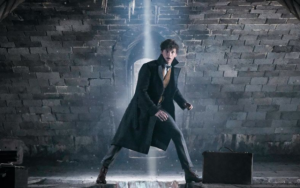FANTASTIC BEASTS: THE CRIMES OF GRINDELWALD: 2 STARS. “Abracaconvulution!”
 If you already know what a ‘magizoologist’ is you’re likely a fan of J.K. Rowling’s wizarding world. If not, you’ve got some catching up to do before buying ticket to the second instalment of the Harry Potter spin-off “Fantastic Beasts: The Crimes Of Grindelwald.”
If you already know what a ‘magizoologist’ is you’re likely a fan of J.K. Rowling’s wizarding world. If not, you’ve got some catching up to do before buying ticket to the second instalment of the Harry Potter spin-off “Fantastic Beasts: The Crimes Of Grindelwald.”
When we last saw magizoologist Newt Scamander (Eddie Redmayne) he temporarily put aside his study of magical creatures to travel to New York City and help MACUSA (Magical Congress of the United States of America) bring the powerful Dark wizard Gellert Grindelwald (Johnny Depp) to justice.
The story picks up as Grindelwald escapes. Like all good villains he craves world dominance, but only on his own terms. He believes in wizarding superiority and sets in motion a plan to lead a new Wizarding Order of pure-blood wizards who will rule over all non-magical beings.
Enter Albus Dumbledore (Jude Law), professor of Transfiguration at Hogwarts School of Witchcraft and Wizardry and an influential member of the British Ministry of Magic. To stop Grindelwald’s diabolical plot Dumbledore contacts Scamander, a confidante and former student.
The film based on the second original screenplay from J.K. Rowling is more fantastical than magical. There are all manner of creatures and wizard’s tricks that could only have sprung from her fertile imagination but there is very little actual cinema magic. Sure Potter fans will love seeing Hogwarts and a glimpse of Quidditch again but that is nostalgia, and Alison Sudol’s Judy Holliday impression is as winning as it was the first time out but overall “The Crimes Of Grindelwald” feels like a placeholder for the films yet to come.
Non-Potter-heads will likely be confused by the barrage of names, the myriad of subplots and a deadly scene about the family tree of Credence Barebone (Ezra Miller) that gives the word convoluted a whole new meaning. Part of the joy of the Rowling’s story weaving in the Potter series was its depth and complexity. Here it feels as though she’s being paid not by the word but by the character.
When director David Yates isn’t bathing the screen with blue digital flames and the like there are things to admire. The set and costume design are spectacular, appropriate for both the 1920s setting and the otherworldly characters. Also interesting are the messages, both timeless—the search for identity—and timely—unity, fear mongering and freedom through force—provide subtext that is more interesting than the actual story.
Ultimately “Fantastic Beasts: The Crimes Of Grindelwald,” despite its grand face, feels thin, over written and under dramatic.
